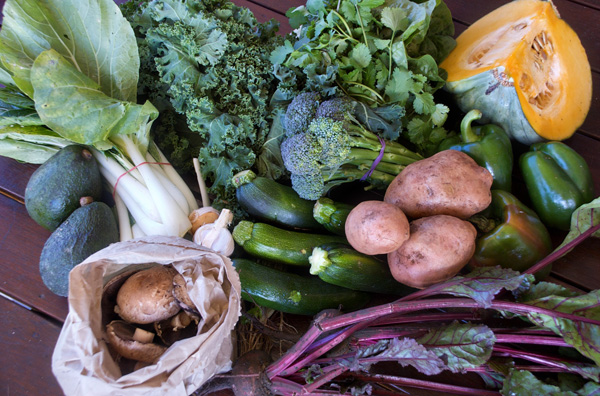19 Easy Ways to Green Your Groceries
This post is the fifth in the Easy Green series by Jo Hegerty of Down to Earth Mother.
Every time we spend money on food and other essentials, we make a choice about the world we want to live in. We can choose to reduce waste and to support resourcefulness, we can choose people over corporations and long-term health over short-term gain. Here are some ideas on how to turn boring old grocery shopping into something that supports a healthy planet, stronger communities and a more sustainable future for our children.
1. Shop in independent stores. Visit the butcher, the baker and the greengrocer.
2. Source fruit, vegetables, meat and eggs from local suppliers to reduce food miles and ensure a better deal for farmers. Visit markets, buy from the farm gate or look online for suppliers.
3. Check all boxed or packaged foods and buy those made in your country or, better still, your state!
4. Find a veggie box-delivery scheme or search for “community supported agriculture” in your area.
5. Keep an eye out for locally produced jams, sauces, curry pastes, sweet treats, cleaning products and more.
6. Eat seasonally. Did you know it takes around 1000kJ of energy to ship 170kJ worth of strawberries from Chile to the US? Unless you live in Queensland or California, strawberries in winter simply don’t make sense.
7. Teach children about seasonality by explaining that foods are cheaper and taste better when in season.
8. Eat more wholefoods and fewer processed foods to save on packaging, embodied energy and to improve your family’s health.
9. Choose organic wherever possible. Organic farming uses less water, no synthetic chemicals and replenishes rather than depletes the soil.
10. Familiarise yourself with the clean fifteen fruits and vegetable with the least chemical residue, and also the dirty dozen.
11. Respect the animals that make it to your plate and choose free-range, sustainable sources and organic wherever possible.
12. Eat less meat and other animal products.
13. Say no to over-packaged foods and individually-wrapped snacks. Pack snacks into containers, cut cheese sticks from the block and fill reusable pouches with yoghurt.
14. Buy staples such as flours, grains, beans and spices in larger-size packets or from bulk food stores where you take your own packaging.
15. When you do shop in supermarkets, vote with your dollars and choose local, sustainably produced items.
16. Grow something edible – snow peas, cherry tomatoes or lemons are great starting points.
17. Support social enterprises like Who Gives a Crap (US and Australia), which delivers toilet paper to your home and donates half its profits to Water Aid.
18. Make your own cleaning products from vinegar, eucalyptus oil, bicarb and lemon.
19. Pay a fair price for household items like mops – ask yourself whether the cost reflects all the materials and transport costs. If not, someone down the line is being exploited.
I promise, it’s not as hard as it sounds. Twelve months ago, my family gave up big supermarkets. These days we source our groceries from a variety of independent shops and markets, and our fruit and vegetables come from no more than 200 kilometres away via a food-box scheme. In addition to feeling really good about supporting our local community and food producers, we no longer need to do an arduous weekly shop at the supermarket, our diet is more varied and we rarely buy things we don’t need. But the greatest benefit is that our kids think it’s totally normal to buy half a lamb, to get eggs from “the egg man”, or to scoop flour from a big bin into a paper bag. We’ve minimalized our rubbish, reduced our food miles and kept our dollars in our community. That’s the kind of world I choose for my children.
How do you green your groceries?
Check out the other posts in the Easy Green series of simple suggestions for reducing your family’s impact on the environment and saving cash at the same time;
- 6 Ways to Save Money…and the Planet
- The One Bag of Trash Challenge
- Fun & Games for Green Families
- 16 Ways to Help Children Want Less




Love this as usual Jo! 🙂 Sharing with my family and friends and pinning now 🙂 Cheers!
Thanks Bek!